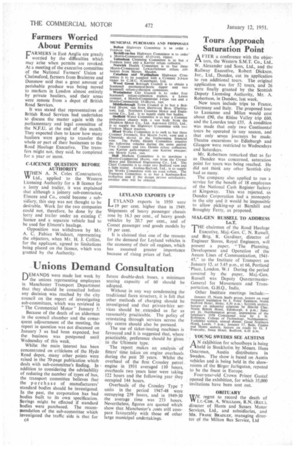Unions Deman d Consultation
Page 42

If you've noticed an error in this article please click here to report it so we can fix it.
DEM ANDS were made last week by the unions representing employees in Manchester Transport Department that they should be consulted before any decision was reached by the city council on the report of investigating sub-committees, which was reviewed in "The Commercial Motor" January 5:
Because of the death of an alderman in the council chamber and the consequent adjournment of the meeting, the report in question was not discussed on January 3 as had been expected, but thebusiness was postponed• until Wednesday of this week.
Whilst the main interest has been concentrated on criticisms of the Hyde Road depot, many other points were raised in the 70-page publication which deals with sub-committee's finding. In addition to considering the advisability of reducing the number of types of bus, the transport committee believes that the p u r chase of manufacturers' standard bodies should be investigated. In the past, the corporation has had bodies built to its own specification. Savings might be effected if standard bodies were purchased. The recommendation of the sub-committee which investigated the traffic side is that for c4 future double-deck buses, a minimum seating capacity of 60 should be adopted.
Without in any way condemning the traditional fares structure, it is felt that other methods of charging should be investigated and that private-hire services should be . extended as far as reasonably practicable. The policy of reinstating through services across the city centre should also be pursued.
The use of ticket-issuing machines is favoured and it is suggested that, where practicable, preference should be given to the Ultimate type.
The report makes an analysis of fitters' time taken on engine overhauls during the past 20 years. Whilst the overhaul of the first Crossley petrol. engine in 1931 averaged 110 hours, civerhauls two years later were taking 122 hours and the following year they occupied 144 hours.
Overhauls of the Crossley Type 7 units in the period 1947-48 were occupying 239 hours, and in 1949-50 the average time was 273 hours. Nevertheless, figures are quoted which show that Manchester's zosts still compare favourably with those of other large municipal undertakings.




































































































